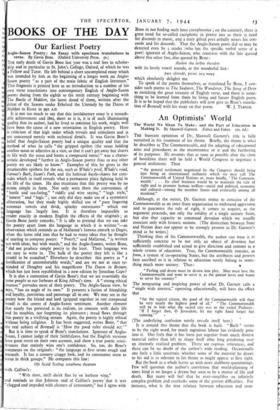BOOKS OF THE DAY
Our Earliest Poetry
THE early death of Gavin Bone last year was a real loss to scholar- ship and in particular to St. John's College; Oxford, of which he was Fellow and Tutor. He left behind a short uncompleted essay which was intended by him as the beginning of a longer work on Anglo-
Saxon poetry " as a part of the main fabric of English literature." This fragment is printed here as an introduction to a number of his own verse translations into contemporary English of Anglo-Saxon
poems dating from the eighth to the tenth century beginning with The Battle of Maldon, the latest dated of them, written after the defeat of the Saxons under Ethelred the Unready by the Danes at Maldon in Essex in got A.D.
It is not too much to say that this introductory essay is a remark- able achievement and that, short as it is, it is of such illuminating quality that its author, had he lived to continue his work, might well have been the cause of a new orientation in English poetry. Here is criticism of that high order which reveals and stimulates and is , not concerned merely with technical details. It was Gavin Bone's
belief that Anglo-Saxon poetry had a unique quality and that the
method of what he calls " the gripped epithet (the noun holding , another noun or adjective in a vice, so that it can't get away but shares its life with the noun and forms a compound name)" was a charac- teristic developed "further in Anglo-Saxon poetry than in any other poetry we are likely to know." Examples of this he gives in the innumerable epithets for the sea, such as Whale's pool, Whale's road, Gannet's Bath, Swan's Path, and the habitual battle-thanes for com- rades which in itself reveals what a permanent place fighting held in the life of the times. He also maintains that this poetry was by no means simple in form. Not only were there the conventions of " battle and sea-faring," " riddle and wise saying," " high style," " lament " and " logic " ; not only did they make use of a systematic alliteration, but they made highly skilled use of " pure lingering sonorous vowels and thick, splashy consonants " which our language has largely lost. It is therefore impossible to render exactly in modern English the effects of the originals; as Gavin Bone justly remarks, " It is idle to pretend that we can take the poetry apart from the language in which it is written "—an observation which reminds us of Mallarme's famous remark to Degas, when the latter told him that he had so many ideas that he thought of starting to compose poetry. " Poetry," said Mallarme, " is written not with ideas, but with words," and the Anglo-Saxons, writes Bone, " did not produce simple poetry in the least. Their language was not easy to write in. The bulk of the poetry they left is like a citadel to be assaulted." Elsewhere he describes this poetry as " a fortification of uncomfortable words," and are we not at once re- minded of Doughty and his magnificent The Dawn in Britain, which has just been republished in a new edition by Jonathan Cape?
It is also a contention of Gavin Bone's that we are essentially the same people as our forbears of King Alfred's time. A " strong ethical interest " pervades most of their poetry. The Anglo-Saxon view, he says,. " has an angle of its own." It presents a fusion of friendship and loyalty, patriotism and patronage all in one. We may see in the poetry how the friend and lord (gripped together in one compound word) is the centre of Anglo-Saxon sentiment. Another element that surely has persisted is its realism, its concern with daily life and its troubles, not forgetting its pleasures ; mead flows through this poetry‘in,a vivifying stream. Again, the poetry is highly ethical 4 without being religious. It has been suggested, writes Bone, " that 1 the real subject of Beowulf is 'How the good ruler should act.' "
But it is time to speak of Bone's translations. Ignorant of Anglo-
Saxon, I cannot judge of their faithfulness, but the English versions 1. have great merit on their own account, and show a true poetic sensi- tiveness that entirely wins one's confidence. So, too, do Bone's comments on the originals: " the language, at first seems rough and uncouth. It has a cornery craggy look, and its consonants seem to 1 occur in thick groups." He compares this line:
Oft Scyld Scefing sceathena theatum with Collins's:
" With short, shrill shriek flies by on leathern wing," and reminds us that Johnson said of Collins's poetry-that it was " clogged and impeded with dusters of consonants," but I agree with Bone in not finding such lines cacophonous ; on the contrary, there is great need for so-called cacophony in poetry just as there is need for discords in music, and a truly gifted poet artfully mixes his con- cords and his discords. That the Anglo-Saxon poets did so may be detected even by a reader (who has the specific verbal sense of a poet) ignorant of Anglo-Saxon, who contrasts with the line quoted above this other line, also quoted by Bone :
Aledon tha leofne theoden
with its lovely vowel sounds, or the wonderful line: pees oferode, pisses swa maeg which absolutely delights me.
To speak of the poems themselves, as translated riy Bone, I con- sider such poems as The Seafarer, The Wanderer, The Song of Deor as enriching the great treasury of English verse, and there is some- thing to be learned from them by living and future English poets. It is to be hoped that the publishers will now give us Bone's transla- tion of Beowulf with his essay on that poem. W. J. TURNER.






















 Previous page
Previous page